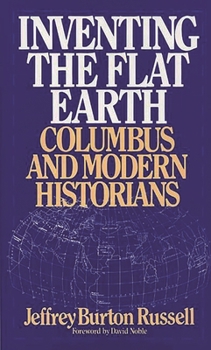Inventing the Flat Earth: Columbus and Modern Historians
Select Format
Select Condition 
Book Overview
Neither Christopher Columbus nor his contemporaries thought the earth was flat. Yet this curious illusion persists today, firmly established with the help of the media, textbooks, teachers--even noted historians. Inventing the Flat Earth is Russell's attempt to set the record straight. He begins with a discussion of geographical knowledge in the Middle Ages, examining what Columbus and his contemporaries actually did believe, and then moves...
Format:Paperback
Language:English
ISBN:027595904X
ISBN13:9780275959043
Release Date:January 1991
Publisher:Praeger
Length:160 Pages
Weight:0.45 lbs.
Dimensions:0.4" x 5.7" x 8.6"
Customer Reviews
4 ratings
Great book - even OT bible quotes say "globe" or "circle" to describe earth
Published by Thriftbooks.com User , 19 years ago
I can only imagine staring up at the sky and watching the moon seeing it's shape obviously round and globular, now believing the earth wasn't flat would not be a hard sell. Bottom line- not everybody thought the earth was flat. Funny though, even today's top scientists and weathermen still insist that the sun rises and sets. Isaiah 40:22
a good statement of the obvious
Published by Thriftbooks.com User , 22 years ago
This is a neat little book, almost too short a book, in which Jeffrey Russell aims to make clear to a popular audience what professional medieval historians have known for years: that the cherished modern notion that all medieval minds thought the earth was flat is simply false. Yet setting the record straight is not Russell's only concern, for in the second half of the book he engages in a historiographical account of how nineteenth century writers invented the notion. Anyone familiar medieval intellectual history has encountered innumerable references to the spherical earth. Thomas Aquinas, Dante, Roger Bacon, writers of travel narratives like John Mandeville, and many others all assumed sphericity (Aquinas, writing around 1250, even offers the statement "the world is round" as an example of something so obvious it needs no proof). In this respect, trying to "prove" that medieval intellectuals did not think the earth was flat is a bit challenging-how does one begin? Russell does a pretty good job, beginning with the controversy over Columbus' voyage (which had nothing to do with the shape of the earth, but was about its circumference), and working backward in a vain attempt to find evidence of flat earth belief. In the process he comes across only five indisputable "flat earthers," at least two of whom were ridiculed during the Middle Ages for being so silly as to be unaware the earth was a sphere. The main culprit is Cosmas Indicopleustes, who thought the earth was flat and beneath a vaulted heaven shaped like a tent. Most people who accuse all medieval people of being "flat-earthers" rest their case on Cosmas, but he was unknown in western Europe (since there was no Latin translation of his Greek work), and at least two Greek-speaking scholars during the Middle Ages dismissed him as a quack. After making relatively short work of the actual geographical knowledge of medieval Europe, Russell charts the progress of the myth of the medieval flat earth, and traces it from the late 18th and early 19th century to the present (with a focus on the mid to late 19th). In this section of the book the author poses some fundamental questions about how and why history is written, and about the very notion of "modernity." For the general reader, this section may hold less appeal than the opening chapters on medieval geography. The book is not perfect. Short shrift is given to flat earth traditions outside of medieval Christianity, including the Near Eastern tradition that accounts for some language suggesting a flat earth in the Old Testament (such references would not have troubled medieval theologians, who did not necessarily privilege the literal sense of scripture). Also Russell should have made more of the association of the medieval belief in the flat earth (myth) with the medieval belief in the geocentric universe (fact). The acceptance of the idea that the Middle Ages believed in the flat earth has been abetted by the ecclesiastical o
Abolishes a Hoary Rationalistic Fairy Tale
Published by Thriftbooks.com User , 23 years ago
During the 19th century, rationalists sought to blacken the reputation of religious believers by attributing to them all forms of malevolence and ignorance. This included inflating the victims of the Inquisition one-hundred fold. So also was the one about medieval theologians wondering how many angels could dance on the head of a pin. It also included the myth about Columbus' contemporaries believing in a flat Earth, largely at the insistence of the Church. This book provides an eye-opening rebuttal to this widely-held rationalistic myth.
Fun book!
Published by Thriftbooks.com User , 26 years ago
A short, readable book that's great for loaning to people that believe the myths that: (1) Columbus proved the world was round. (2) People in the "middle ages" believed that the world was flat. (3) The Church was/is "against science"





